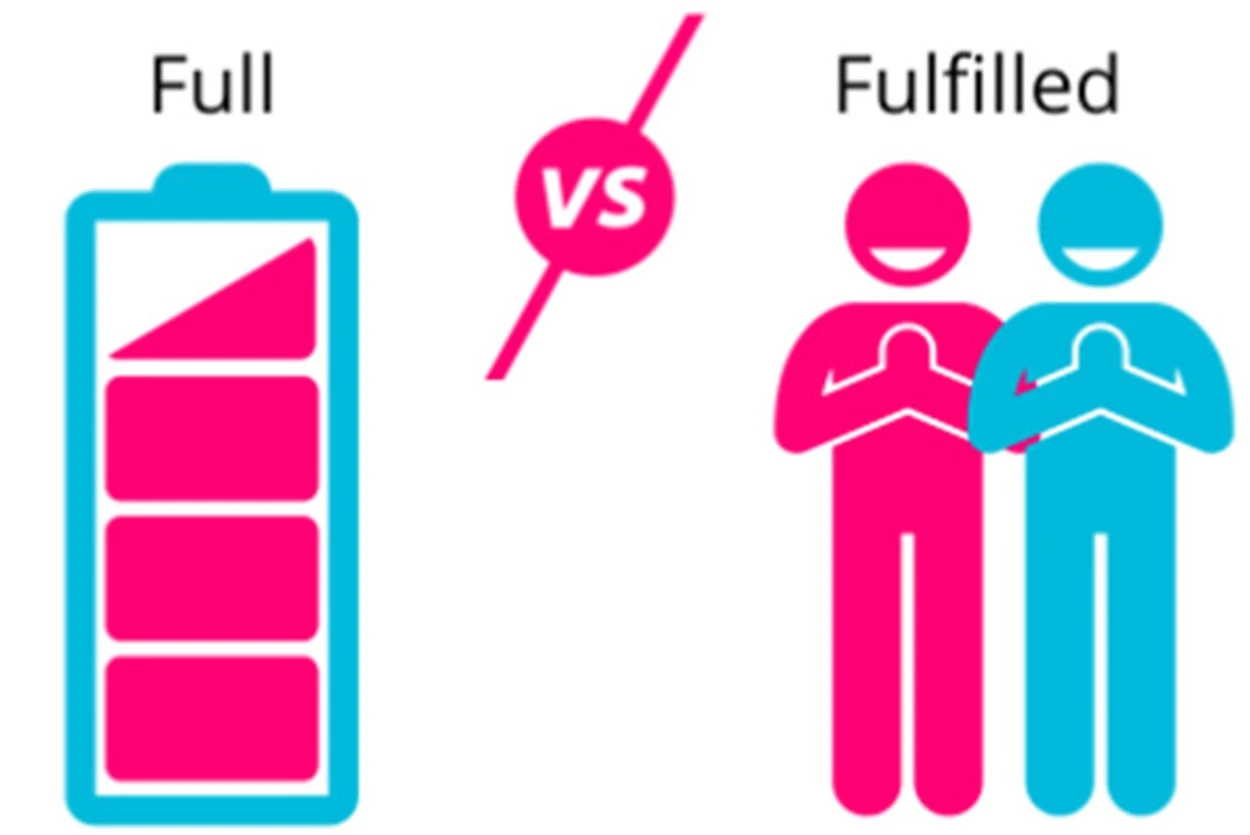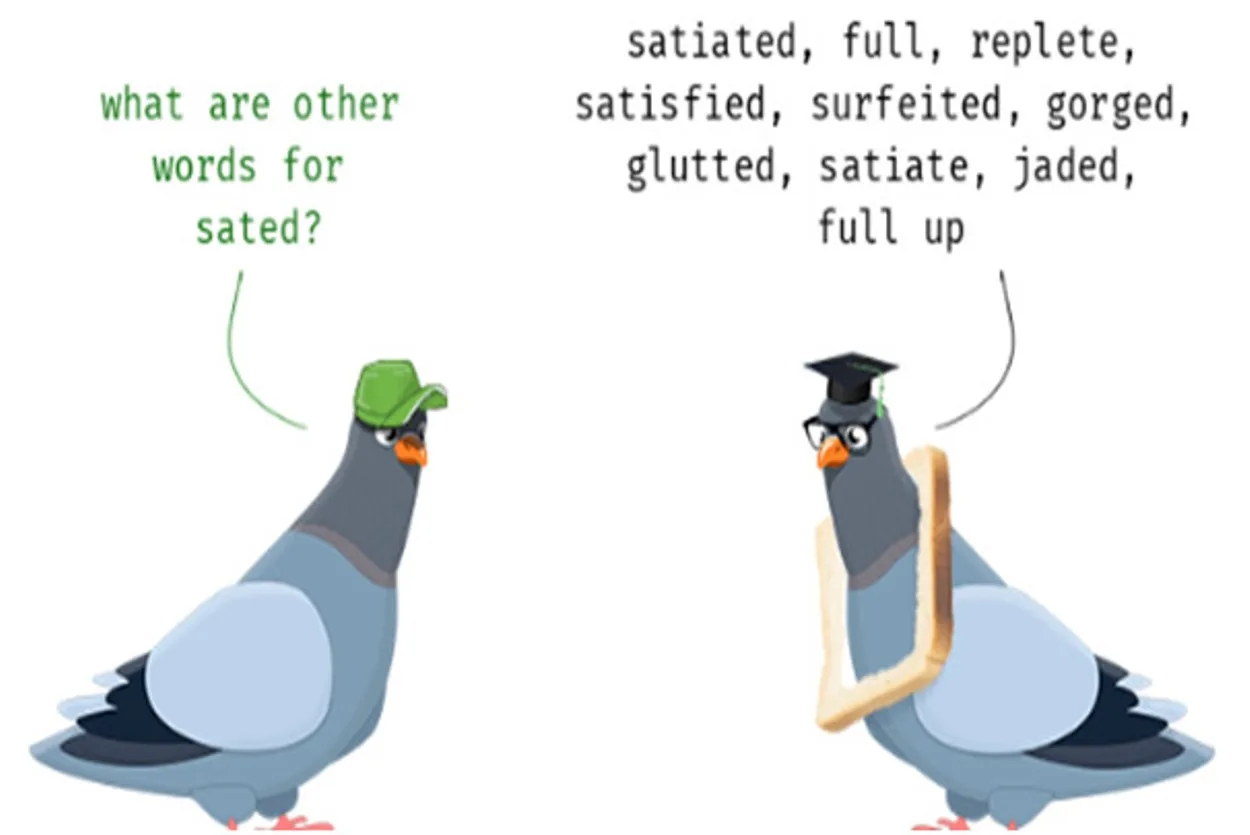Every language has certain words that are used interchangeably and have similar meanings. The English language has the same case. It has many words in the dictionary that are typically similar.
Although the definitions are fairly similar, sated has a meaning of being contentedly fulfilled while satiated can also suggest something is excessively so.
This article will distinguish between the phrases “sated” and “satiated,” which have similar meanings. We shall, however, view them from a different perspective. So, without leaving you with any worries about “how it is feasible,” we’ll go right into our piece.
We will first have an overview of the difference between these two words and then go into the details.
An Overview Of The Difference
To “satiate” means to satisfy a need, generally with food or pleasure. We shall use the term “satiate” to mean that we are full to the point of contentment or even excess. Similarly, being “satiated” involves completely satisfying our desires.
As a result, “satiated” and “sated” can be used interchangeably because they signify the same thing.
Because the meanings of “satiate” and “sated” are comparable, they can be used interchangeably and as synonyms.
Furthermore, the meanings of “satiated” and “sated” for the degree of satisfaction are nearly identical. If there is a distinction, it is so small that they appear to convey the same message.
What’s The Meaning Of “Sated”?
We shall use the word “sated” to mean that we have completely gratified our cravings. In terms of connotation, we might use it to suggest that we have overburdened our wants to the point that we cannot accept any more. This phrase is frequently used as a synonym for “satiated.”
Let’s see some examples of this word:
- Every effort was worthwhile. After taking a long route, I was sated as soon as we reached the hotel.
- When the children are fully sated with playing, they are ready to head towards the table for the afternoon lunch.
- Our desire for adventurous activities was sated during our vacation to Colombia.
- My mum made supper despite the large mound of food. We were hungry, and it took some time for us to get sated.
- I’m sated with this great soup and this exquisite American champagne.
- After five hours of wandering through the jungle, we came to a clear brook. We drank till we were completely sated.
- When the new water tank supplies water to the entire town, the people’s thirst will be sated.
If you want to listen to the pronunciation of this word along with the meaning, then click the YouTube video below.
What’s The Meaning Of “Satiated”?
When you’re “satiated,” you’ve entirely met your needs; thus, you’re stuffed with food, water, or pleasures. This word also implies an excess on the level of happiness you have attained. It is a synonym meaning satiated, overburdened, or fed up.
Let’s see some examples of this word:
- We decided to take a bus to the Mountain Ranges since the breathtaking vistas had satiated us.
- Even though her desire for revenge had been satiated, nothing had altered. She continued to be harsh.
- According to some ancient thinkers, the unending cravings we experience throughout our lives can only be satiated by dissolving the ego.
- Christmas is coming up next week. I am confident that we will find several options that satiate our needs.
- Until you discover true love, you will never be fully satiated.
Which Is Most Widely Used?
Google and Google Trends show that “sate” is the more widely-used term, albeit this appears to be large because of journalists continually misspelling “state.” The term “satiated” appears to stem from the Latin “satis,” which means enough. (Satisfied?)
“Sate” stems from ancient English, Dutch, and Germanic and probably has the same root word as “sad.” However, all of this depends on which one you would use in any situation. It also depends on which one you get on your tongue while speaking and which one you like to use.
What’s The Difference Between These Two Terms?

“Satiated” carries a feeling of “excessiveness or being over the top” despite the three extra letters a and t.
“Sated” indicates “completely satisfied” regarding desire or hunger.
“Satiated” refers to someone who has received more than enough, sometimes to the point of contempt or tiredness. “Satiety” refers to the sensation of having eaten too much.
Sated and satiated are both terms used to describe a feeling of being full; however, the difference between them lies in the degree of fullness experienced. Sated typically means to be full, whereas satiated means to be full till excess.
For example, if you eat a light snack, you might feel sated. On the other hand, if you indulge in a full-course meal, you might feel satiated.
- A person is eating a large meal.
- The person was feeling hungry before the meal.
Before beginning the meal, the person was hungry. Even after the first few bites, their hunger began to ease. As they continued to eat, they felt their stomach fill, and their hunger gradually dissipated until they were sated. After finishing the meal, they felt deeply satiated and content.
The definitions are fairly similar, but “sated” implies being blissfully content, whereas “satiated” implies that something is excessively so. Therefore, excessiveness is covered in the word “satiated,” whereas having a normal level is covered in the word “sated.”
Now that we have covered the difference between these two words in paragraph form. Let’s take an overview in tabular form.
| Features | Sated | Satiated |
| Spelling difference | It doesn’t contain an extra “t,” “i,” and “a” in the middle | It has a “t,” “i,” and “a” in the middle |
| Meaning difference | Completely satisfied | Excessiveness or being over the top |
What Does It Mean To Be “Sated”?
To be “sated” meaning is that you are completely satisfied with something. The word “sated” (comparative: more sated, superlative: most sated) means you are in total and comprehensive contentment, having enough of anything to satisfy one’s hunger.
Does “Satiated” Mean “Satisfied”?
Satiated originates from the Latin “satiare”, which means “fill, full, satisfy,” which is exactly how a satiated person feels – full and content after a nice meal.
Nothing like a good home-cooked supper to leave you satisfied and satisfied.
Is “Sated” The Same Word As “Satiated”?

Satiate and sate might sometimes mean merely perfect fulfillment, but they also mean repletion that has removed interest or desire.
Therefore, apart from a little difference in spelling and pronunciation, both have a similar meaning. According to several dictionaries, these words don’t look different; they hold differently.
Is “Sated” A Noun, Verb, Or Adjective?
The word sated is a verb, a simple past tense of the word “sate.” Let’s try to understand it with more example sentences:
- The dinner sated his appetite completely.
- The information sated their curiosity.
You can see from the above sentences how it is utilized in the sentences and which form it has. So it is a verb which is showing some action that happened.

Is “Satiated” A Noun, Verb, Or Adjective?
Like the word sated, satiated is a verb because they have almost similar meanings.
Both of them show some action happened. However, the level of occurrence and action can differ, which we have discussed in detail.
What Food Keeps You “Satiated”?
You might have noticed that we have used this word for the fulfillment of hunger, referring to food. So let’s look at what type of food we are referring to.
High-fiber meals give volume and take longer to digest, allowing you to feel fuller for longer while consuming fewer calories. Vegetables, fruits, and whole grains contain fiber.
A nice illustration of whole grain with low calories and large volume is popcorn.
Conclusion
- We’ll claim that “sated” and “satiated” describe a condition of satisfying wants and desires, generally with food, water, or pleasures.
- So, anytime you hear these two terms, you’ll understand what they imply. Because they are synonyms, we may exchange them without the risk of making a mistake.
- However, if we want to figure out the difference between these two terms, there are only slight differences.
- One is the difference in the spelling of the two words. On the other hand, another difference is the degree of fullness felt. Sated usually means full, although satiated also implies full. For example, you may feel sated if you consume a small snack. A full-course dinner, on the other hand, may leave you feeling satiated.
- So there aren’t any big differences between these two words. Whatever you want to use, you can easily use any one of them.
Other Articles
- What Is The Difference Between Shine And Reflect? Do Diamonds Shine Or Reflect? (Factual Check)
- Continuum vs. Spectrum (Detailed Difference)
- What’s The Difference Between “Affecting Change” And “Effecting Change?” (The Evolving)
- What Is The Difference Between Perseverance And Determination? (Distinguished Facts)

